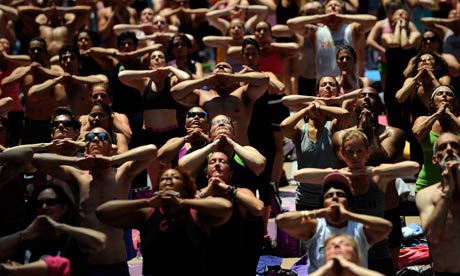
A group of California parents are campaigning for the withdrawal of school yoga classes, believing the activity promotes Hinduism.
In an effort to promote student health, a school district in Encinitas incorporated the yoga classes into its wellness curriculum this week. But a vocal minority of parents, spurred on by an evangelical Christian group, are calling for the program to be dropped.
The parents are backed by the National Center for Law & Policy, a Christian civil liberties organization that advocates for religious causes. The NCLP, a non-profit group, said it is considering suing the school because it claims yoga is inherently religious.
After the yoga classes were introduced, the NCLP released a four-page document listing reasons why it believes the school district is promoting a religious form of the activity.
Many of the NCLP's claims center on the Jois Foundation, an Encinitas non-profit created in memory of Krishna Pattabhi Jois, who popularized the Ashtanga school of yoga. The district received a $533,000 grant from the foundation and also receives support from University of Virginia and University of San Diego, which are measuring the effects of yoga on children's health.
Timothy Baird, the school district superintendent, told Encinitas Patch that the district selected instructors and designed the program so there is no religion element to it it.
"To be unconstitutional, we would have to be promoting religion and religious instruction in our program. That just isn't happening," Baird said. "What we are promoting is physical activity and overall wellness."
Jon Gans, a member of the board of directors for USA Yoga, a body that promotes yoga in the US, said he has never been in a yoga class where people were encouraged to believe in a religious practice. "Yoga is a set of exercises to improve your body and your mind. It can be applied to anything you want; it is not in and of itself a religious practice," Gans said.
The NCLP insists that the Jois Foundation is a religious institution and that the Foundation's promotion of Ashtanga form of yoga is inherently religious.
Eugene Ruffin, the director of the PK Jois Foundation, who had a Catholic upbringing, denies that the student yoga classes promote religion. Ruffin told local Encinitas radio station KPBS: "They provide you with the exercise and the motivation for children and then they give you character exercises, thou shalt not steal, thou shall be honest, thou shall be respectful to adults."
Ann Gleig, the editor of Religious Studies Review and assistant professor of religious studies at the University of Central Florida, said in an email that two groups have continually asserted that yoga is inherently religious – evangelical Christians, and some Hindus who want to preserve the practice's religious influences.
"So both of these groups, which have very different agendas, ironically support each other in an historically flawed construction of yoga as an essential unchanging religious practice that is the 'property' of Hinduism," Gleig said.
Andrea Jain, assistant professor of religious studies at Indiana University-Purdue University Indianapolis said that the forms of yoga commonly practiced in the US are the result of the mix of colonial India and euro-American physical culture.
"In fact, postural yoga has been shown to be a successor of fitness methods that were already common in parts of Europe and the United States before postural yoga was introduced," Jain said. "So we could think of postural yoga as a 20th century product, the aims of which include all sorts of modern conceptions of physical fitness, stress reduction, beauty and well-being, these things were not present in pre-colonial traditions of yoga at all."
These postural forms of yoga include Ashtanga yoga, which was introduced in the early 20th century.
"Unless we want to argue that contemporary American culture and its valorization of physical fitness, beauty and health, modern conceptions of those things are religious values, then we really can't identify yoga as religious," Jain said. "We certainly can't identify it as essentially Hindu."
The Encinitas school district is the only known public school system in the US where yoga instructors teach full time; it has included yoga as part of its greater wellness program that includes nutrition initiatives and personal growth initiatives. As part of this plan, the district has removed juice from school lunches to encourage consumption of milk and replaced buns and breads with whole wheat versions of the products.
The program was initially tested at a few of the district's nine middle and elementary schools before being incorporated into every school's curriculum this week.
• This article was amended on Friday January 11. We quoted Andrea Jain as saying 'So we could think of postural yoga as a 21st century product …' This should have been '20th century'. This has now been changed.

